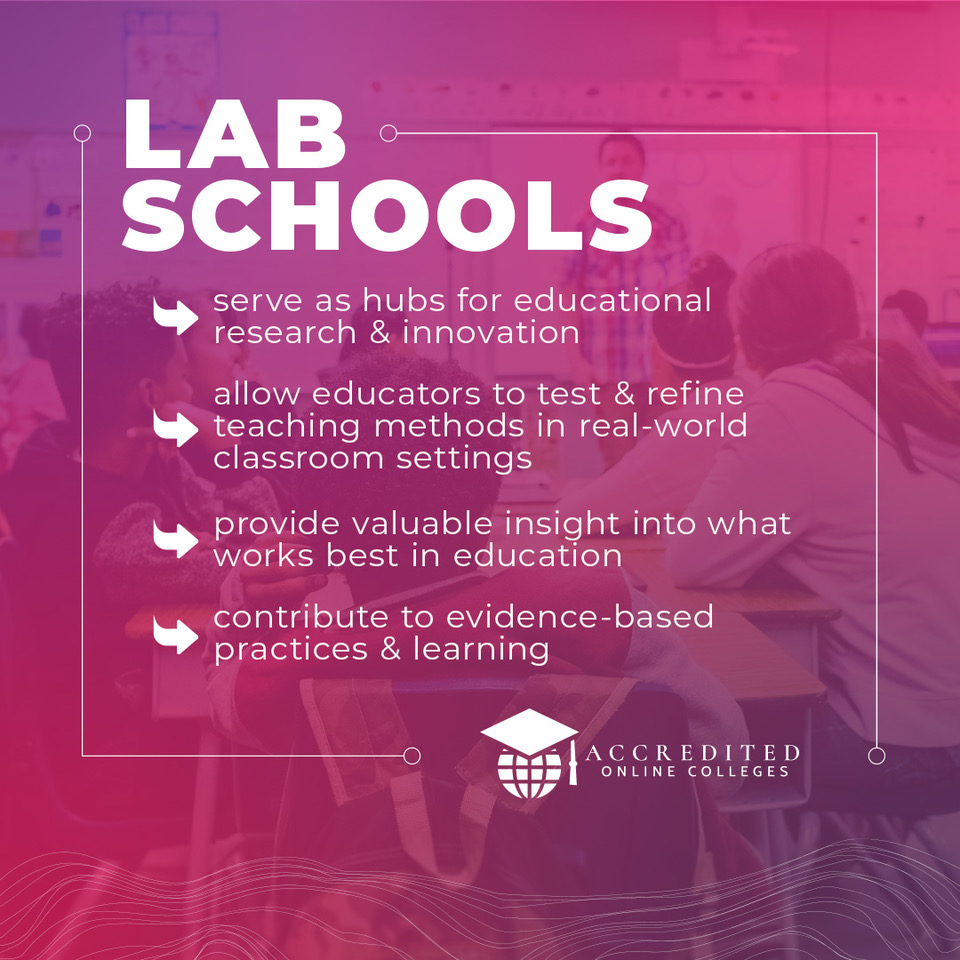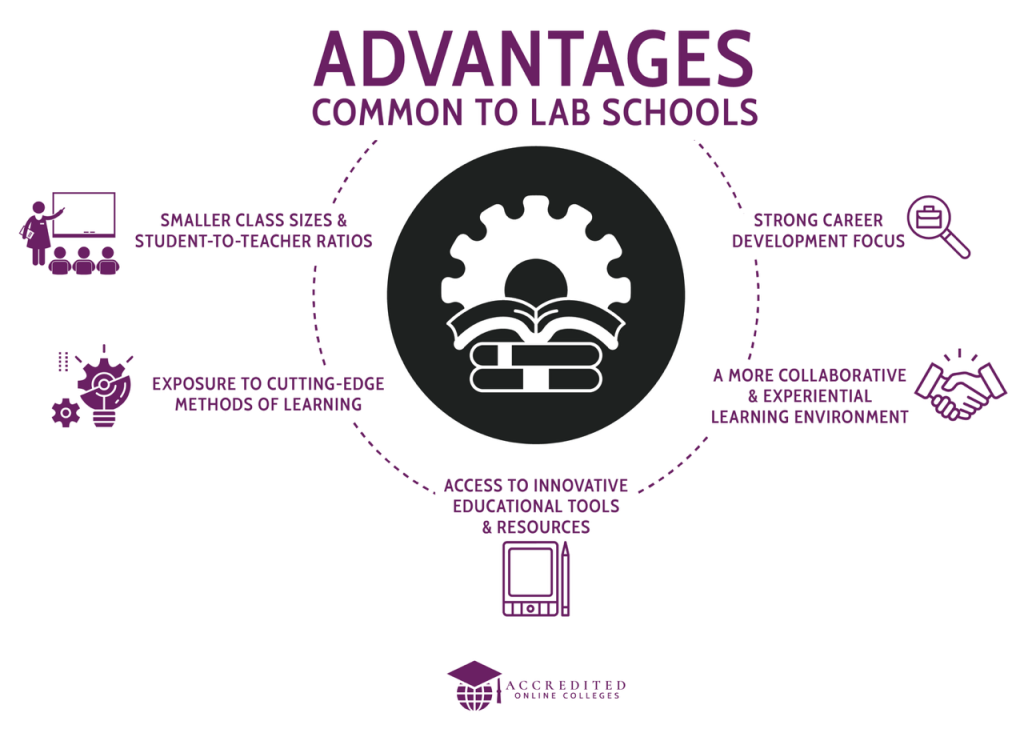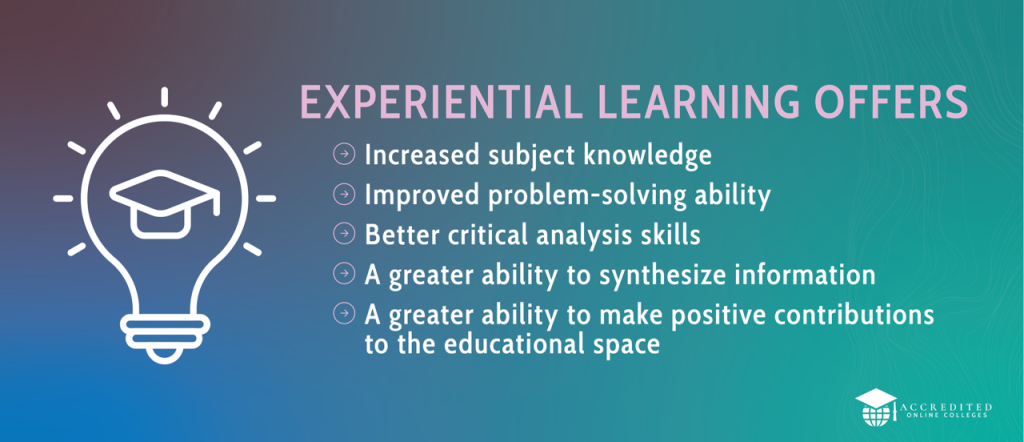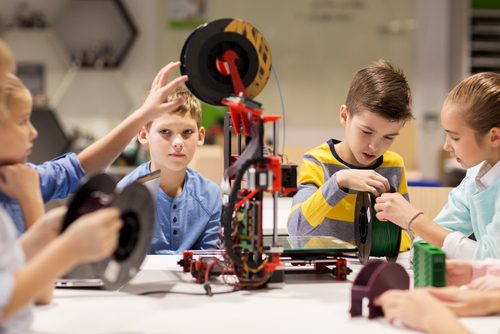A lab school is to education what a teaching hospital is to medicine. It’s a put-your-skills-to-the-test environment for pre-professional teachers. Lab schools are typically affiliated with a large college or research university and are often found directly on campus.

What is a Lab School?
In addition to serving as pre-service training facilities for future teachers, lab schools serve as experimental settings for new and emerging educational theories and techniques.
For example, Dewey’s Lab School at the University of Chicago focuses in part on social reform. Today’s lab schools often maintain that concentration, along with pursuing social justice, diversity, inclusion, and a community focus.
Lab schools are typically pre-K through 12th grade and often operate on non-traditional schedules. So, while many traditional public schools might have classes five days a week from August through May, lab schools might have year-long academic calendars with shorter, more frequent breaks rather than a lengthy summer break.
Lab schools usually have a unique approach to educational administration, teaching, and learning.
Traditional management at a school is structured with:
- principal
- assistant principal
A lab school might also have:
- research professors
- outside educational experts
- parents
- other stakeholders heavily involved in the school’s administration
Classroom instruction is often non-traditional, too, with many classrooms having multiple teacher educators collaborating to provide the most robust learning environment possible.
Find out about the schools Accredited Online College chose as the top 15 Lab Schools in the U.S.A here.
What are the Advantages of Lab Schools?

The primary advantage of lab schools is that they are typically associated with an institution of higher learning. That collaboration opens up many resources – human and monetary, to name but two – that enable innovation within the school.
For example, some lab schools have a strong career development focus that connects classroom learning, including experiential learning activities, to the workplace. Other lab schools offer a clear pathway between K-12 education and college, acting on the close ties they have with higher education.
Lab schools are often progressive and inclusive, too, which helps build a more diverse and accepting school environment.
Related: 30 Best Online Master’s in Educational Leadership
How do Lab Schools Implement Experiential Learning?

The experiential learning component mentioned earlier is worth additional examination as it pertains to lab schools.
To understand why experiential learning is so important, we must first arrive at a definition of experiential learning. The Association for Experiential Education offers an excellent one: challenge and experience followed by reflection, leading to learning and growth.
Experiential learning is active experimentation to promote student learning. Students and teachers alike take part in direct learning experiences that are followed by structured reflection.
What experiential learning learning is not is passive learning. Instead, it’s an active process that brings the learning space alive with multiple perspectives, respect for diversity, and a commitment to collaboration – all primary tenets of most lab schools.
Related: Top 21 Best Online Master’s in Educational Technology
Experiential Learning in K-12 Education
Teacher educators in K-12 settings can utilize experiential learning techniques to enhance student development and prepare kids for the next step in their educational process. This learning-by-doing style of teaching has long been popular in some subjects – science, for example, in which hands-on activities like experiments are often undertaken.
But experiential learning can be applied in any subject, from music education to social studies to physical education, and all points in between, by using theories like those devised by David Allen Kolb.
Kolb’s Experiential Learning Cycle
Kolb’s learning cycle is based on the tenets of multiple educational theorists (e.g., Jean Piaget, John Dewey, Kurt Lewin), all of whom emphasized the importance of active engagement in the learning process. As noted by the Center for Teaching at the University of Iowa, Kolb built on the theories of earlier research and devised a four-step process of experiential learning:
- Concrete experience – The learner engages in the activity.
- Reflective observation – The learner considers how the activity went, including successes and failures, and integrates past experiences and conceptual understanding.
- Abstract conceptualization – The learner forms conclusions about their learning, interprets their experiences, and otherwise seeks to learn from their experience.
- Active experimentation – The learner tests what they’ve learned in novel experiences.
According to Kolb, this process is cyclical, so that learners can enter the cycle at any point. However, to have the greatest impact, learners need to complete the entire cycle regardless of the point at which they enter it.
A good example of experiential learning in a lab school might proceed as follows:
- Concrete Experience: Eighth-grade social studies students participate in a mock trial, with students playing the parts of the prosecution, defense, judge, jury, and so forth.
- Reflective Observation: Students reflect on their contributions to the trial, its outcome, etc. This is done in small groups to facilitate reflection and feedback.
- Abstract Conceptualization: Students consider their experience and draw conclusions about the activity (e.g., “the strength of the argument the defense presented convinced me that the defendant was not guilty”)
- Active Experimentation: Students participate in another mock trial, this time adopting different roles than before (e.g., a student who was a juror might now serve as the defense attorney, allowing them to integrate what they learned in the first mock trial to improve their defense of their client).
Not only are experiential learning activities like these much more engaging for students, but they are also more effective in helping students attain and retain knowledge and skills. Moreover, the practice of active engagement in the learning process allows students to build an understanding of how this information is relevant and helpful for future learning.
